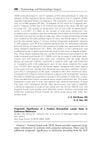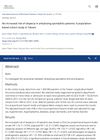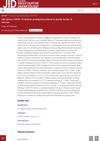 8 citations,
January 2018 in “Journal of the American Academy of Dermatology”
8 citations,
January 2018 in “Journal of the American Academy of Dermatology” Diphenylcyclopropenone treatment helps prevent hair loss relapse in alopecia areata patients.
[object Object]  8 citations,
May 2019 in “Journal of dermatological treatment”
8 citations,
May 2019 in “Journal of dermatological treatment” Vismodegib is effective for basal cell carcinoma but has severe side effects.
 4 citations,
January 2022 in “Drug design, development and therapy”
4 citations,
January 2022 in “Drug design, development and therapy” Intramuscular corticosteroids are effective and safe for severe alopecia areata, with most patients regrowing hair, but nearly half may relapse.
 January 2011 in “Yearbook of Dermatology and Dermatologic Surgery”
January 2011 in “Yearbook of Dermatology and Dermatologic Surgery” Finding a positive nonsentinel lymph node in melanoma patients indicates a worse prognosis.
 June 2024 in “Research Square (Research Square)”
June 2024 in “Research Square (Research Square)” Absence of skin rash and low complement C3 levels increase the risk of lupus nephritis.
 1 citations,
July 2022 in “International Journal of Rheumatic Diseases”
1 citations,
July 2022 in “International Journal of Rheumatic Diseases” People with ankylosing spondylitis in Taiwan don't have a higher chance of getting alopecia.
82 citations,
July 2012 in “Brain pathology” High LGR5 levels in glioblastoma indicate poor prognosis and are essential for cancer stem cell survival.
 2 citations,
February 2022 in “Frontiers in Endocrinology”
2 citations,
February 2022 in “Frontiers in Endocrinology” Antiandrogenic pretreatment for women with PCOS does not improve fertility outcomes and delays pregnancy.
 63 citations,
December 2002 in “Archives of Dermatology”
63 citations,
December 2002 in “Archives of Dermatology” The 308-nm excimer laser is a promising treatment for vitiligo with varying success and mild side effects.
 32 citations,
May 2006 in “The Journal of Urology”
32 citations,
May 2006 in “The Journal of Urology” Using finasteride with TIP extends time off period for prostate cancer patients.
 6 citations,
December 2013 in “Journal of Dermatological Science”
6 citations,
December 2013 in “Journal of Dermatological Science” Women with alopecia may have a higher chance of getting thyroid cancer.
 31 citations,
May 2021 in “Journal of endocrinological investigation”
31 citations,
May 2021 in “Journal of endocrinological investigation” APS-1 in Italy shows diverse AIRE mutations and various autoimmune issues.
 26 citations,
November 2016 in “European Journal of Clinical Pharmacology”
26 citations,
November 2016 in “European Journal of Clinical Pharmacology” Valproic acid helps delay hair loss and increases survival time for high-grade glioma patients undergoing radiation therapy.
 14 citations,
December 2017 in “Journal of Bone and Mineral Metabolism”
14 citations,
December 2017 in “Journal of Bone and Mineral Metabolism” Women with polycystic ovary syndrome have a higher risk of certain fractures.
 5 citations,
February 2023 in “European journal of endocrinology”
5 citations,
February 2023 in “European journal of endocrinology” Older patients with Cushing's syndrome often have different symptoms and treatment outcomes compared to younger patients.
 1 citations,
January 2024 in “Nature communications”
1 citations,
January 2024 in “Nature communications” Activating TLR5 in the gut can extend lifespan and improve health in aged mice.
 April 2024 in “bioRxiv (Cold Spring Harbor Laboratory)”
April 2024 in “bioRxiv (Cold Spring Harbor Laboratory)” Removing Sprouty genes in mice causes various hormone-related issues but does not increase cancer risk by one year of age.
 April 2015 in “Andrology”
April 2015 in “Andrology” HNG may help prevent the negative effects of chemotherapy on sperm production and white blood cell counts.
3 citations,
June 2017 in “The Journal of urology/The journal of urology” Older men with postoperative urinary retention are more likely to need future bladder procedures.
 April 2023 in “Journal of Investigative Dermatology”
April 2023 in “Journal of Investigative Dermatology” People who had severe COVID-19 are more likely to experience hair loss.
20 citations,
December 2017 in “Cardiovascular diabetology” Linagliptin slows down premature aging in certain mice.
17 citations,
May 2019 in “Journal of International Medical Research” Xiaoaiping reduces chemotherapy side effects and improves quality of life for breast cancer patients.
 March 2024 in “BMC cancer”
March 2024 in “BMC cancer” High levels of ST14 and TMEFF1 proteins in ovarian cancer are linked to worse patient outcomes and may be a new treatment target.
52 citations,
February 2003 in “Archives of dermatology” 9-cis-retinoic acid showed some effectiveness in treating AIDS-related Kaposi sarcoma but had significant side effects at higher doses.
30 citations,
September 2016 in “Aging Cell” Low selenium levels can extend lifespan but worsen health issues.
[object Object] 29 citations,
June 2015 in “Kidney International” Disrupting the Flcn gene in mice causes early kidney cysts and tumors, which can be treated with rapamycin.
February 2024 in “Frontiers in Cell and Developmental Biology” Eribulin-based chemotherapy is more effective and has fewer side effects for advanced triple-negative breast cancer.
 April 2012 in “The Journal of Urology”
April 2012 in “The Journal of Urology” Eating more omega-3 and less omega-6 fatty acids may lower the risk of developing prostate cancer.
 February 2022 in “Research Square (Research Square)”
February 2022 in “Research Square (Research Square)” High TSPEAR levels in colorectal cancer predict worse outcomes.
 January 2022 in “Research Square (Research Square)”
January 2022 in “Research Square (Research Square)” High TSPEAR levels in colorectal cancer predict worse outcomes.






















